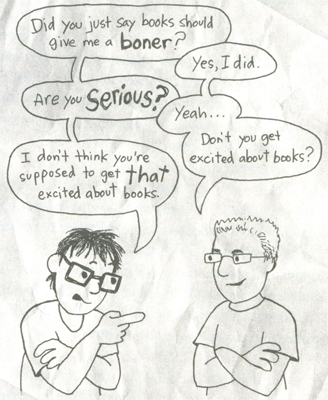I hate
this
article on public discourse by Jon Lovett. I like it when I hate an article. It's a kind of high praise. It means the author
says enough to elicit that kind of response from me. There is some smart stuff
in the article, and it's funny in all the right places. But I do hate it.
Like the author,
I am also
afraid that our current public discourse is too black and white.
But I disagree with the solution presented here. The author
writes:
We need to learn to live with the noise and tolerate the
noise even when the noise is stupid, even when the noise is offensive, even
when the noise is at times dangerous. Because no matter how noble the intent,
it’s a demand for conformity that encourages people on all sides of a debate to
police each other instead of argue and convince each other. And, ultimately,
the cycle of attack and apology, of disagreement and boycott, will leave us
with fewer and fewer people talking more and more about less and less.
It sounds nice. I agree part of the problem is a “cycle of
attack and apology, of disagreement and boycott.” And I love this quote that
describes the result of that cycle: “What’s left is the pressure to sand down
the corners of your speech while looking for the rough edges in the speech of
your adversaries.”
But the solution presented here is not an actual solution.

Lovett wants people to stop reacting so rashly to things
that offend. He claims “we can live with the noise, even embrace the noise,
without trying to drown each other out.”
But that won’t work, because the rash reactions he wants us
to curtail – those are part of the noise Lovett wants us to embrace.
We can’t ask people to stop reacting – to stop being
offended – while simultaneously supporting the right to offend. They are both
speech acts, and if you want to support one, then you have to support the
other.
I came to this realization while reading one of Lovett’s
main supporting points. He uses
the
brief tenure of Brenden Eich as the CEO of Mozilla as an example of the “cycle
of attack and apology.” It’s the most recent example of what Lovett describes
as “people who were told [via the public discourse] to shut up.”
I’ll agree, there was a strong reaction to Eich’s
appointment, but no one told him to shut up.
The CEO is the public face of a company. It is a position
unlike other executive positions. That person is being asked to represent a company’s
ideals and philosophy to investors and customers. It is a difficult and very
public job, but that is the job you are giving to someone when you make them
CEO.
No one told Eich to shut up. People said, “If Mozilla is
going to appoint a CEO who contributed money to a cause we think is discriminatory,
then Mozilla is saying that is part of their company’s philosophy.” No one expressed
that view while
Eich
was serving as the company’s CTO from 2005-2014, and that is because CEO is
a very different position – a very public position in comparison to CTO.
People had a strong reaction because a person who holds a view
they find offensive was elevated to a highly public position.
That reaction is part of the noise Lovett is asking us to
embrace.
You don’t have to agree with Eich or the people at
OKCupid.
But it is not okay to ask one of them to sit back and listen,
to “live with the noise.”
The solution is not to halt the strong reactions. The
solution is to pay more attention to the smart reactions.

The human act of perceiving sound is astounding, not because
we silence extraneous noise, but because our mind is able to pick out and
interpret one distinct sound while our ears are assaulted by a cacophony of noise.
That should be our goal as we listen to public discourse.






